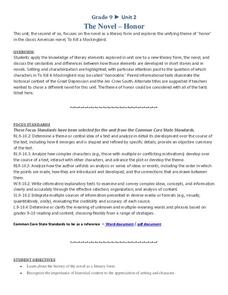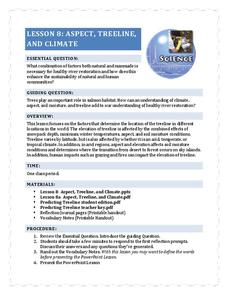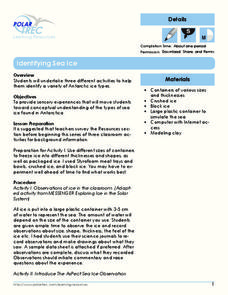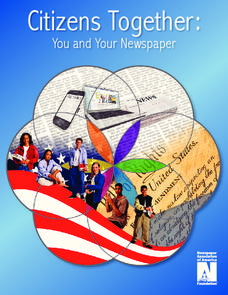West Jefferson High School
The Novel — Honor
For classes tackling To Kill a Mockingbird, this lesson plan sets readers up for discussions or essay writing with questions and prompts. The prompts encourage individuals to explore beyond the novel itself, looking at photographs from...
National Park Service
Aspect, Treeline, and Climate
Head to the treeline and beyond to examine how this feature of the landscape affects weather and climate, which gives scientists clues about its health. Class members' observations of photographs provide the data that drives the...
University of Minnesota
Ways of Knowing: Apples as Models
Use apples as a way of thinking about models. Young scientists consider how the word apple, a two-dimensional drawing, a three-dimensional image, a photograph, and plastic apples all model real apples in preparation for developing models...
Polar Trec
Identifying Sea Ice
Sea ice contains 17 sub-types based on age and various characteristics. Scholars observe ice floating in a simulated ocean and record their observations. Then, they view photographs of different types of sea ice and learn to...
PBS
The Sixties: Notes from the Ho Chi Minh Trail
Young historians research the rationales for fighting the Vietnam War, and the controversies surrounding it. They watch film clips, examine photographs, and read Lyndon B. Johnson's message to Congress to gather information for a...
CK-12 Foundation
Stem-and-Leaf Plots and Histograms: Digital Photography
Cameras use histograms to communicate the exposure of a photograph. An interesting lesson uses this idea to help learners deepen their understanding of histograms. It highlights the skew of the graphs by showing under- and overexposed...
Nosapo
Writing Prompt: Write About a Photo
Practice descriptive writing with a prompt that includes a photograph. Writers craft the whole story of the single second caught in a photo using the provided questions to prompt their imaginations.
National Park Service
A Tale of Two Men
Theodore Roosevelt and the Marquis de Mores were both born in 1858, and both came to the Dakota territory in 1883, but they influenced the developing country of America in different ways. Elementary and middle schoolers apply written and...
PBS
Using Primary Sources: Nazi Spy Ring Busted
Spy games are not just for professionals anymore! Scholars use short video clips, primary documents, and photographs to investigate Nazi spies in America during World War II. The young detectives analyze the paranoia warfare can create...
Mississippi Bar
The 2018 Mock Trial Case
All rise! Scholars put their skills to the test in a mock trial. Using evidence, photographs, and testimony, they role play the trial in the classroom. Rules of law—and the court room—come to life as the class becomes a place of law!
PBS
Thomas Edison: Inventor and Entrepreneur
How many of Thomas Edison's inventions do your scholars use every day? They might be shocked to find out! Young historians watch a video, analyze a photograph, and read one of Edison's letters to learn more about his life and impact....
Newspaper Association of America
Citizens Together: You and Your Newspaper
Not all news in a newspaper comes in the form of a traditional article; photographs, charts, and even editorial cartoons help spread important information, too. A civics-based unit describes the parts of the newspaper as tools for...
Annenberg Foundation
Taming the American West
Have you ever seen a movie about the romance of the American West with its buffalo, horses, cowboys, and endless frontier? The 13th installment of a 22-part series on American history presents the myths associated with the American West....
Annenberg Foundation
Postwar Tension and Triumph
Go get the American Dream lifestyle! The 19th lesson in a 22-part series exploring American history shows learners the post-WWII economic boom. Using primary sources, photographs, and cartoons, groups discuss their findings and present...
Annenberg Foundation
Egalitarian America
What does a true American represent? Scholars investigate the equal rights era of the 1960s and 1970s in the 20th installment of a 22-part series on American history. Using photographic, magazine, written, and video evidence, groups...
Annenberg Foundation
Global America
It's not really a small world after all! The 21st lesson of a 22-part series on American history researches the impact of globalization on the United States. Using photographic and written references materials, as well as video sources,...
NET Foundation for Television
1850-1874 Native Americans and Settlers
Did Western settlers receiving free land from the Homestead Act realize it wasn't really free at all? Scholars investigate the impact Western expansion had on Native American culture in the mid-1800s. They use documents, timelines, and...
NET Foundation for Television
1850-1874 Homestead Act Signed: Who were the Settlers?
Life in the great, wide-open spaces of the West! Scholars analyze the reasons behind the vast movement to the Great Plains after the passing of the Kansas-Nebraska Act and the Homestead Act. Using photographic, document, map, video, and...
NET Foundation for Television
1850-1874 Beef Moves to Nebraska
Just how long was the Long Drive? Learners investigate the movement of cattle in the Great Plains during the mid-1800s. They incorporate photographic, newspaper, video, and primary source evidence into their posters, artwork, and written...
NET Foundation for Television
1850-1874 Railroads and Settlement
Have you ever wondered how your town was placed where it is? Scholars research the impact the advancement of the railroad due to the passage of the Kansas-Nebraska Act had on the formation of civilization in the Great Plains. Map...
Annenberg Foundation
Pre-Columbian America
What was life like in America before Christopher Columbus discovered the New World? Scholars investigate life in the Americas through the eyes of Native Americans in the first lesson of a 22-part series covering America's history. Using...
PBS
Mountain Weather: Orographic Lift
Why do so many mountain ranges exist next to a desert? As part of a larger series, PBS 6-8 Weather and Climate answers this question. The presentation offers diagrams and photographs of the development of a rain shadow. From Oregon to...
PBS
Rosa Parks: Civil Rights Activist
Scholars examine the courageous efforts made by civil rights activist, Rosa Parks. Discussion questions and a brief writing assignment follows a short film. A photograph and a silent film delve deeper into Park's history and three...
Google
Snapchat Geofilter
Sometimes pictures could use a little help. Scholars add filters, frames, stamps, and text to a background photograph. They learn to use variables, encapsulation, sequences, and objects as they use the Blockly programming language.
Other popular searches
- Photography
- Digital Photography
- Photography History
- Digital Camera
- Black and White Photography
- Portrait Photography
- Food Photography
- Photography Lesson Plans
- Digital Pictures
- Creative Project Photography
- Life Photography
- Photography Camera

























